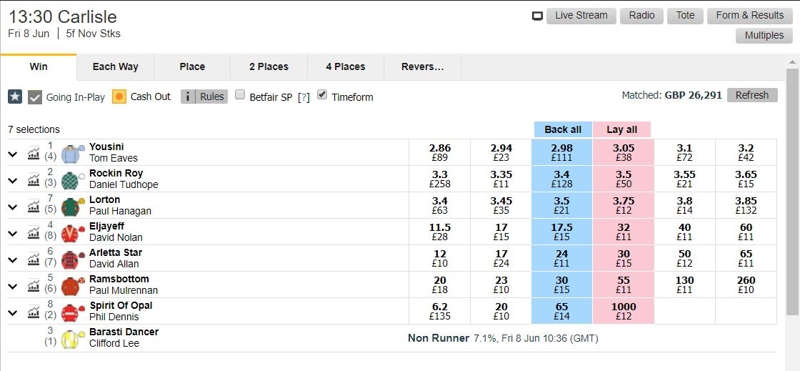At a Betting Exchange, the bets you place are against other punters rather than the bookmaker. This results in two key benefits – the ability to bet against something (eg: a specific horse not winning a race – known as a ‘lay bet’) and odds which are often better than those offered by a traditional bookie. The following table lists the leading betting exchanges for UK bettors.
List of Betting Exchanges
* Betdaq do not need to offer a commission based rewards program as they have it set at 2% for everybody.
Betting Exchanges Explained
The principle of how a betting exchange works is relatively simple. Each exchanged bet requires two or more customers who wish to place opposite bets. For example, one punter wants to bet that Arsenal will win the Champions League and one wants to bet that they wont.
When placing a bet with a traditional bookmaker the odds are set by the bookie, and you have no other choice but to accept the odds on offer or go elsewhere. At a betting exchange you are able to set your own odds – if the opposing bet is already available at the odds you have selected the bet is instantly ‘matched’ and good to go. However, if you decide to hold out for better odds your bet will remain ‘unmatched’ until somebody accepts those odds.
One of the most appealing features of a betting exchange is the potential success of hedging your original bet when the odds move in your favour. For example, lets say you place a bet on Manchester United to win the Premier League at the start of the season at 10/1. If they win their first 3 games and shoot to the top of the table, these odds will drop as the likelihood of them winning the league increase. You can now lay (bet against) Manchester United winning the premier league at the lower odds to lock-in a net win.
How Do Betting Exchanges Make Money?
A traditional sports betting site generates its revenue by working a margin into the odds they offer. So if you were to place proportional bets on every outcome of an event (eg: bet on every horse in a race), the money won would be less than your total stake.
Betting Exchanges, on the other hand, make money by charging winning bets a commission – the actual rate varies by exchange but is usually around 5%.
Betfair vs Betdaq
Betfair was the first betting exchange, and to this day remains the largest. However its biggest competitor, Betdaq, has been gaining ground recently thanks to its lower commission rate. In this next section, we’ll compare these betting exchanges on liquidity, odds, features & promotions.
Liquidity & Odds
As the larger of the two exchanges, Betfair definitely has the highest liquidity – although Betdaq continues to narrow the gap between the exchanges. In terms of odds, for the most part both Betfair and Betdaq are comparable although Betfair definitely has the edge on less popular markets.
This is, of course, before you take the betting exchange’s commission into account. Betdaq have recently introduced a 2% flat rate commission for all sports and markets, compared to Betfairs 5%. Therefore a winning bet at Betdaq would yield a slightly higher return than the same bet at the same odds at Betfair.
In the image below you can see a direct comparison between Betdaq (above) and Betfair (below) just before the start of a race.

Features
- Mobile Betting: As you would probably expect, both exchanges offer mobile apps for various smartphones and tablets – including iPhone, iPad, Android and Blackberry devices.
- Live Streaming: Betfair and Betdaq both offer live horse racing streams provided by ATR and RUK which you can watch for free provided you have placed a bet on the market. Betfair also offers live streams of various non-racing events such as soccer, tennis and basketball.
- Multiples: One type of bet which cannot be placed via an exchange platform is a multiple or accumulator bet. However, Betdaq and Betfair also offer customers traditional bookmaker style beting – where the bets are placed against the site rather than another customer.
History
 A betting exchange allows punters to bet peer-to-peer. This means that instead of betting against a bookmaker, you actually bet against a fellow punter. The exchange allows you to lay a result, basically meaning you’re backing against a result.
A betting exchange allows punters to bet peer-to-peer. This means that instead of betting against a bookmaker, you actually bet against a fellow punter. The exchange allows you to lay a result, basically meaning you’re backing against a result.
The first exchange was set up by a site called Flutter.com in May 2000. A couple of months later the more familiar brand of Betfair was launched and the two eventually merged. Betfair were the first company to offer a full betting exchange experience by actually offering laying options on all their markets. The company has since gone from strength to strength and now reportedly controls over 90% of the betting exchange marketplace.

Betfair was founded by Andrew Black and Edward Wray who were amongst the first people in the world to apply a betting exchange to the online betting market. For their efforts both Black and Wray went on to win many prestigious awards for innovation, most notably the Ernst and Young Emerging Entrepreneur of the Year award. The company went on to win the Queen’s award for Enterprise making them just one of 50 companies to have done so at the time.
Over the years the company continued to expand, not only in terms of the number of markets offered, but also the number of countries in which they operated. The major pull a betting exchange, such as Betfair, has is that you often find yourself receiving inflated odds compared to what you would find at a bookmakers. This is mainly down to the fact that you bet with other punters rather than taking a price with a margin worked in to make it advantageous for the bookmaker. Betfair make their money by taking a 5% commission on all matched bets. This is taken directly from the punter rather than the lines or odds set on their site.
As the company has continued to grow it’s of little surprise to see the market coverage and development of markets grow also. Every major sport from football to futsal, golf to Gaelic games and even mixed martial arts to motor sports can be found on Betfair, and the array of markets for each is vast. It’s much easier for a company such as Betfair to offer more markets than most bookmakers because they don’t need to research lines, set bets or anything like that as the punters do it themselves. The bookie simply open the market and lets the punter do the work.

